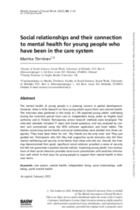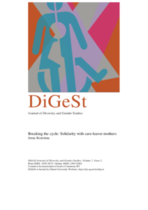Caitlin Hitchcock, Benjamin Goodall, Olivia Sharples, Richard Meiser-Stedman, Peter Watson, Tamsin Ford, Tim Dalgleish - Journal of the American Academy of Child & Adolescent Psychiatry
This article explores population-level prevalence of Posttraumatic stress disorder for Young Children (PTSD-YC) to test whether application of Alternative Algorithm for PTSD (AA-PTSD) criteria, relative to the DSM-IV PTSD algorithm, increases identification of 5-6 year old children with clinical needs, in both the general population, and among looked-after-children where the risk of mental health issues is greater.


